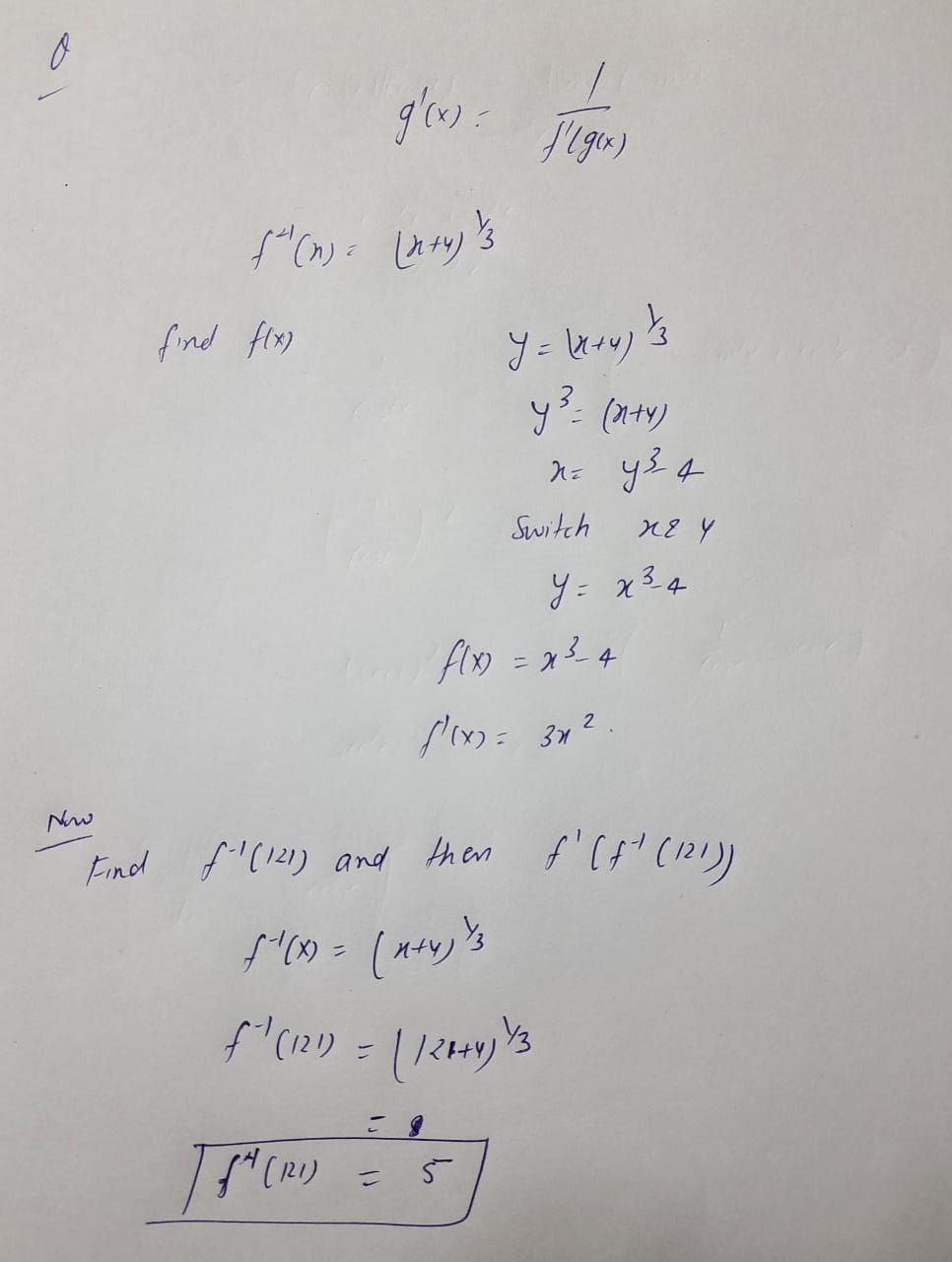
Calculus: Early Transcendentals
8th Edition
ISBN: 9781285741550
Author: James Stewart
Publisher: Cengage Learning
expand_more
expand_more
format_list_bulleted
Question
thumb_up100%
![**Step 4**
To find \((f^{-1})'(x)\), use the theorem that states that if \(f\) is differentiable on an interval \(I\) and \(f\) has an inverse function \(g\), that is \(g = f^{-1}\), then \(g\) is differentiable at any \(x\) for which \(f'(g(x)) \neq 0\) and \(g'(x) = \frac{1}{f'(g(x))}\).
Find the values of \(f^{-1}(121)\) and then \(f'(f^{-1}(121))\),
\[ f^{-1}(x) = (x + 4)^{1/3} \]
\[ f^{-1}(121) = 5 \]
\[ f'(f^{-1}(121)) = f'(5) \]
\[ = 3(5)^2 \]
\[ = 75 \]
**Step 5**
Substitute the above values in the expression for \((f^{-1})'(121) = \frac{1}{f'(f^{-1}(121))}\).
\[ (f^{-1})'(121) = \frac{1}{75} \]
Thus, \((f^{-1})'(121) = \frac{1}{75}\).](https://content.bartleby.com/qna-images/question/679cf9fe-7ea4-4759-a28d-7fe07c30cdca/36d90f50-e676-43a0-94f0-f87f7a03b138/8ikavd_thumbnail.png)
Transcribed Image Text:**Step 4**
To find \((f^{-1})'(x)\), use the theorem that states that if \(f\) is differentiable on an interval \(I\) and \(f\) has an inverse function \(g\), that is \(g = f^{-1}\), then \(g\) is differentiable at any \(x\) for which \(f'(g(x)) \neq 0\) and \(g'(x) = \frac{1}{f'(g(x))}\).
Find the values of \(f^{-1}(121)\) and then \(f'(f^{-1}(121))\),
\[ f^{-1}(x) = (x + 4)^{1/3} \]
\[ f^{-1}(121) = 5 \]
\[ f'(f^{-1}(121)) = f'(5) \]
\[ = 3(5)^2 \]
\[ = 75 \]
**Step 5**
Substitute the above values in the expression for \((f^{-1})'(121) = \frac{1}{f'(f^{-1}(121))}\).
\[ (f^{-1})'(121) = \frac{1}{75} \]
Thus, \((f^{-1})'(121) = \frac{1}{75}\).
Expert Solution
arrow_forward
Step 1

Step by stepSolved in 2 steps with 2 images

Knowledge Booster
Similar questions
- Let F(x) = f(f(x)) and G(x) = (F(x))'. You also know that f(9) = 2, f(2) 3, f'(2) = 11, f'(9) – 9 Find F'(9) and G'(9) = Question Help: Video Submit Questionarrow_forwardLet f(x) be a function that is differentiable for all x. Let g(x) be defined by g(x) = f(x) + f(3 – x). Show that g'(x) has a root in the interval (0,3). (a) (b) Let f(x) be continuous and differentiable on the interval [-8,0]. Suppose f(-8) = -2 and f'(x) < 3 for all x. What is the largest possible value for f (0)? Justify your answer.arrow_forward
Recommended textbooks for you
 Calculus: Early TranscendentalsCalculusISBN:9781285741550Author:James StewartPublisher:Cengage Learning
Calculus: Early TranscendentalsCalculusISBN:9781285741550Author:James StewartPublisher:Cengage Learning Thomas' Calculus (14th Edition)CalculusISBN:9780134438986Author:Joel R. Hass, Christopher E. Heil, Maurice D. WeirPublisher:PEARSON
Thomas' Calculus (14th Edition)CalculusISBN:9780134438986Author:Joel R. Hass, Christopher E. Heil, Maurice D. WeirPublisher:PEARSON Calculus: Early Transcendentals (3rd Edition)CalculusISBN:9780134763644Author:William L. Briggs, Lyle Cochran, Bernard Gillett, Eric SchulzPublisher:PEARSON
Calculus: Early Transcendentals (3rd Edition)CalculusISBN:9780134763644Author:William L. Briggs, Lyle Cochran, Bernard Gillett, Eric SchulzPublisher:PEARSON Calculus: Early TranscendentalsCalculusISBN:9781319050740Author:Jon Rogawski, Colin Adams, Robert FranzosaPublisher:W. H. Freeman
Calculus: Early TranscendentalsCalculusISBN:9781319050740Author:Jon Rogawski, Colin Adams, Robert FranzosaPublisher:W. H. Freeman
 Calculus: Early Transcendental FunctionsCalculusISBN:9781337552516Author:Ron Larson, Bruce H. EdwardsPublisher:Cengage Learning
Calculus: Early Transcendental FunctionsCalculusISBN:9781337552516Author:Ron Larson, Bruce H. EdwardsPublisher:Cengage Learning

Calculus: Early Transcendentals
Calculus
ISBN:9781285741550
Author:James Stewart
Publisher:Cengage Learning

Thomas' Calculus (14th Edition)
Calculus
ISBN:9780134438986
Author:Joel R. Hass, Christopher E. Heil, Maurice D. Weir
Publisher:PEARSON

Calculus: Early Transcendentals (3rd Edition)
Calculus
ISBN:9780134763644
Author:William L. Briggs, Lyle Cochran, Bernard Gillett, Eric Schulz
Publisher:PEARSON

Calculus: Early Transcendentals
Calculus
ISBN:9781319050740
Author:Jon Rogawski, Colin Adams, Robert Franzosa
Publisher:W. H. Freeman


Calculus: Early Transcendental Functions
Calculus
ISBN:9781337552516
Author:Ron Larson, Bruce H. Edwards
Publisher:Cengage Learning